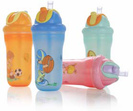
In 2010 New York passed a law prohibiting the use Bisphenol A (BPA) in certain products such as plastic baby bottles and cups. Previously, chemical BPA had been used since the 1950's and was in everyday common items such as food and beverage containers, compact discs and sales receipts.
Widespread research evidenced that BPA mimics estrogen in the body and is linked to a variety of health problems such as cancer, neurological defects and reproductive defects. As a result of growing consumer concern and objection, many manufacturers stopped using the chemical BPA. However, BPA was quickly replaced with Bisphenol S (BPS), which gave plastics the same type of resilient shatter proof quality that BPA provided.
Current research, such as studies from Tuffs University and the University of Texas, indicate that BPS is virtually equal to BPA in toxicity. The Texas study indicated that BPS, like BPA, also mimics the estrogen hormone interfering with the body's response to natural estrogen hormones. Although certainly more research is needed regarding the safety of BPS, it raises serious questions as to the process and speed in which chemicals are introduced into the marketplace. Perhaps in order to prevent circumvention of consumer protection laws, we need a law prohibiting marketplace acceptance of a "six of one, half dozen of the other" mentality.
Long Island Lawyer
Paul A. Lauto


 RSS Feed
RSS Feed

